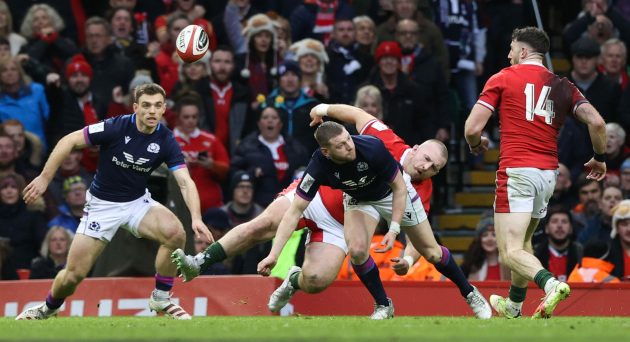Players are often banished to the sin-bin after preventing a pass from reaching its target. Rough justice or just deserts? Read this debate from our March 2022 issue
Face-off: Are deliberate knock-ons treated too harshly?
CHRISTY DORAN
YES, says the Fox Sports Australia rugby correspondent
We call players freaks of nature regularly. From Rieko Ioane to Cheslin Kolbe, Louis Rees-Zammit to Damian Penaud, grounding the ball is a modern art form. But when it comes to intercepts, no, no, catching the ball with one hand is suddenly a leap too far.
“Not in a realistic position to catch the ball,” cry referees from all corners of the world. “Your hands were pointed down,” others say. Who are the referees to tell some of the best athletes in the world what someone can and cannot do?
Watch any highlights reel from the past decade and it will be jaw-dropping.
Deliberate knockdowns came to a head last autumn during Wales’ great escape against the Wallabies. On 22 minutes Kurtley Beale paid the price for putting an egg in each basket by stretching his arms wide, second-guessing the Welsh attack. For the average Joe, it looked like a player attempting to wrap.
On 47 minutes Nick Tompkins stopped and started again as everyone else thought they had witnessed a deliberate knockdown of Tom Wright’s pass. But the ball had bounced backwards, according to referee Mike Adamson.

Take a break! Mike Adamson cards Kurtley Beale during Australia’s defeat by Wales in November (Getty)
The deliberate knockdown can’t be a law because it’s not black and white, it’s riddled in grey in a game that is confusing itself with its laws.
Rugby encourages players of all shapes and sizes and works like chess. But if there is one law it should borrow from rugby league, it’s that there is no such consequence for a knock-on. It’s either a knock-on or play on. Replicating league would cut out the grey and the subjectiveness of one of rugby’s strangest laws.
ALAN PEAREY
NO, says the Rugby World writer and sub-editor
Jeopardy in sport is good. It’s part of the thrill. There’s nothing wrong with a defender trying to intercept a pass – it’s a skill all of its own – but if you get it wrong don’t expect sympathy. Like a goal-line breakdown steal, it’s high risk, high reward and be prepared to pay the consequences for a misjudgment.
If you make a genuine attempt to catch the ball and knock it on, it’s a scrum to the attacking side. Fine. But as we all know, players frequently make little or no effort to catch the ball. They’re merely intent on stopping the move.

Wasps’ Will Porter saw yellow last week for deliberately hitting Adam Radwan’s offload into touch (Getty)
To take a recent example, Montpellier wing Pierre Lucas brought a halt to a glorious Leinster attack featuring multiple offloads by slapping the ball down near the try-line. What a killjoy! As it happened, Wayne Barnes played advantage and Leinster scored, but Barnes should have binned Lucas anyway. Negative actions like that should be punished.
As Barnes explains in a YouTube video using plastic figures on a LEGO board, the main device for ascertaining whether a knock-on is deliberate is whether the defender’s hands are facing up or down. That might not be perfect but so what. The game isn’t perfect, nor are referees and their decisions.
The point is that rugby should favour the attack, it should frame its laws to discourage cynicism. Such as when a defender, close to the passer, tries to disguise a deliberate knock-on as an accidental byproduct of a wrap tackle. Crafty. And illegal – off you go for ten minutes!
We want to see flowing rugby and moves being finished, not knock-ons and slap-downs. A successful intercept? Great. Often that sparks an exciting foot race to the opposing line. It’s part of the jeopardy, part of the fun. But like putting your chips on red at the roulette wheel and seeing it come out on black, don’t go bleating if your boldness backfires.
Face-off: Are deliberate knock-ons treated too harshly? We want to know what YOU think. Email your views to rugbyworldletters@futurenet.com

Mattia Bellini tries to block George North’s offload during a Wales-Italy match in Cardiff (Getty Images)
This debate first appeared in the March 2022 issue of Rugby World.





